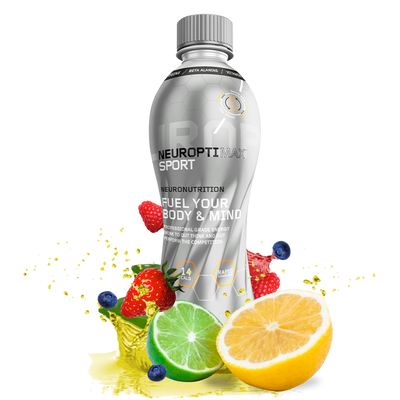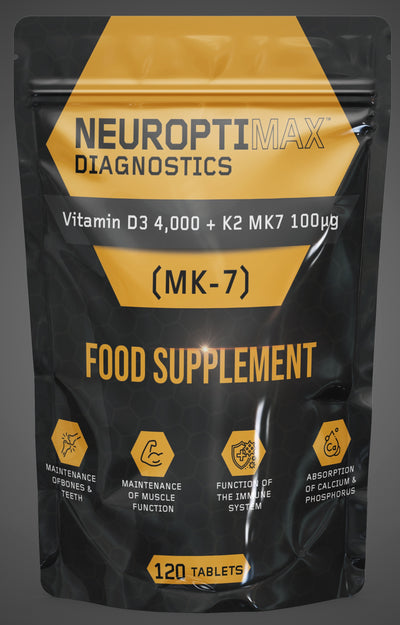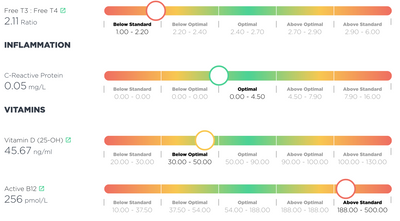
Overview
As you may know by now, the type of food you eat plays an important role in how your brain functions. Supplying your nerve cells with the necessary nutrients to reach optimal performance is one of the most influential steps you can take.
However, it can be difficult to achieve this task without knowing which nutrients are deficient in your body. For this reason, you need to understand a concept known as nutrient biomarkers.
In this article, we will cover the key nutrient biomarkers to boost brain health and cognitive performance. But first, let us define what is a nutrient biomarker.
Key nutrient biomarkers – Definition
If you do a quick Google search, you will find the following definition for nutrient biomarkers: “they are a characteristic that can be measured in different biological samples, such as urine, that can be used as indicators for nutritional status.”
In plain English, a nutrient biomarker is a biological measurement that allows us to determine the status of a specific nutrient in your body.
For example, measuring the serum level of ascorbic acid is a great indication of how much vitamin C you have in your system. Another example is the levels of nitrogen in your urine, which gives us an idea of how much protein you are consuming in your diet.
Identifying and measuring the key nutrient biomarkers for brain health and performance will allow you to adjust your diet based on the results. After a while, this will dramatically improve the function of your central nervous system, leading to improved concentration, critical thinking, memory, etc.
The key nutrient biomarkers for brain health and performance
1. Vitamin B6
Pyridoxal-5-phosphate is perhaps the most important nutrient biomarker for brain health and performance. Measuring this marker gives us an idea of the levels of vitamin B6 in your system. The latter has a variety of functions related to neurons and the connections that link them.
Vitamin B6 also protects the nerve cells from external damage by shielding their axons.
People who are deficient in vitamin B6 experience a variety of neurological symptoms that could be devastating if not addressed promptly.
2. Thiamin
Thiamin is another name for vitamin B1, which is also a key biomarker for brain activity. Extremely low levels of vitamin B1 lead to a condition known as Beriberi, which is common in alcoholics.
However, being moderately deficient in vitamin B1 can also lead to a variety of symptoms, including:
- Loss of appetite
- Blurry vision
- Nausea and vomiting
- Fatigue
- Irritability
- Reduced reflexes
- Tingling sensation in arms and legs
- Muscle weakness
3. Riboflavin
By now, you may start to notice a pattern; B vitamins seem to be very important for the functioning of brain cells.
This brings us to riboflavin or vitamin B2. If your test results come back low in riboflavin, it is time to consult with your doctor about the best ways to replenish your supplies of this vitamin.
Common signs of low vitamin B2 levels include gait disturbance, which describes abnormal walking patterns, and ocular issues (e.g., abnormal eye movements).
4. Folic acid
Folic acid, vitamin B9, is an integral substance for the multiplication of nerve cells. It is also vital for the physiological development of fetuses.
In fact, the World Health Organization (WHO) recommends that all women of reproductive age should start taking folic acid even if they are sexually inactive.
Newborns to mothers who were deficient in folate are suspectable to a condition known as spina bifida, which presents with an abnormal structure of the spinal cord.
Folate is also indispensable for cognitive function and critical thinking.
5. Ascorbic acid
As mentioned at the beginning of this article, serum levels of ascorbic acid reflect the levels of vitamin C in your system.
According to one study, vitamin C is crucial for the normal functioning of neurons. This makes ascorbic acid a key nutrient biomarker for brain health and performance.
6. Vitamin E
Vitamin E concentration in the blood is another indication of brain function. It serves as a potent antioxidative that shields neurons from the damage of free radicals.
However, the damage of deficient levels of vitamin E extends beyond cognitive function and impacts most organ systems, including the skin.
7. Vitamin D
Vitamin D deficiency is very common during the fall and winter seasons. Due to low exposure to sunlight, the physiological production of vitamin D plummets.
On the molecular level, vitamin D acts as a neurosteroid, entering the nuclei of brain cells and stimulating the synthesis of certain proteins and lipoproteins that protect the cells.
Unfortunately, up to one-third of the United States population is borderline deficient in vitamin D. For this reason, if you do a complete biological panel, make sure vitamin D is on that list.
8. Vitamin B12
Back to B vitamins.
Vitamin B12, in particular, is very important for the production of myelin sheaths, which protect nerve cells from oxidative damage and other harmful processes.
Making sure that you have enough vitamin B12 in your system is absolutely vital. We should note that the absorption of vitamin B12 depends on a molecule known as an intrinsic factor (IF). IF is found in the lining of the stomach.
Therefore, individuals who undergo gastric bypass – a surgical procedure that accelerates weight loss– need continuous supplementation of vitamin B12 and intrinsic factor.
9. Magnesium
Last, and certainly not least, we have magnesium.
According to some studies, low serum magnesium can lead to chronic anxiety, depression, and other mental disorders.
One analysis concluded that people over the age of 65 years old with magnesium deficiency are at a higher risk of developing severe forms of major depressive disorder.
Takeaway message
Understanding the role of nutrient biomarkers in assessing brain performance and identifying them can be a game-changer for people who want to reach optimal cognitive function.
We hope that this article managed to shed some light on this complex topic and cleared a few myths surrounding brain performance and nutrition.



